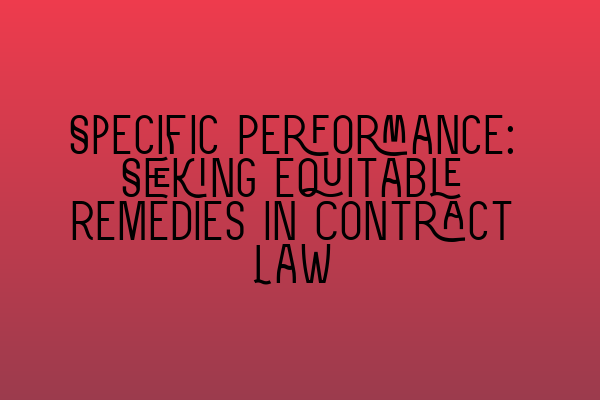As a solicitor and expert in contract law, I often encounter situations where parties to a contract fail to fulfill their obligations. In such instances, seeking equitable remedies becomes necessary to ensure fair and just outcomes. One such remedy is specific performance, which allows a party to demand the exact performance promised in the contract. In this blog post, we will explore the concept of specific performance in contract law and why it is considered an equitable remedy.
What is Specific Performance?
Specific performance is an equitable remedy that a court can order in certain contract disputes. It involves compelling the breaching party to fulfill their contractual obligations precisely as outlined in the agreement. This remedy is usually sought when monetary damages would not adequately compensate the injured party.
For example, let’s say you have entered into a contract to purchase a piece of land for your construction business. However, the seller decides to back out of the deal at the last minute, leaving you without a crucial asset for your project. In this situation, seeking specific performance would allow you to ask the court to order the seller to go through with the sale and transfer the land to you as initially agreed.
Conditions for Seeking Specific Performance
Specific performance is not a remedy that is automatically granted in every contract dispute. Courts consider several factors before deciding whether to order specific performance:
- Feasibility: The court examines whether it is practically possible for the breaching party to perform their obligations precisely as specified in the contract.
- Enforceability: The court assesses whether it has the power to adequately supervise and enforce the specific performance order.
- Uniqueness: If the subject matter of the contract is unique or rare, such as a specific piece of artwork or a historical property, the court may be more inclined to order specific performance.
- Mutuality: Specific performance is usually granted when both parties would suffer irreparable harm if the contract is not performed as agreed.
It’s essential to remember that specific performance is a discretionary remedy, meaning that the court has the discretion to decide whether to grant it based on the specific circumstances of the case.
The Difference Between Specific Performance and Damages
When a party breaches a contract, the non-breaching party often has the option to seek monetary damages instead of specific performance. Damages are intended to compensate for the losses and harm caused by the breach. However, in some situations, monetary compensation may not be sufficient to remedy the harm caused.
For instance, in a case where a rare and valuable antique is promised to a buyer in a contract, no amount of money can truly replace the intrinsic value and uniqueness of the item. In such cases, specific performance becomes a preferred remedy sought by the aggrieved party.
It’s worth noting that specific performance is not available for all types of contracts. It is more commonly requested in contracts relating to real estate, personal property of unique value, and contracts for labor or services.
The Advantages and Disadvantages of Seeking Specific Performance
When contemplating whether to seek specific performance as a remedy, it’s crucial to consider both the advantages and disadvantages:
Advantages:
- Exact fulfillment: Specific performance ensures that the breaching party follows through precisely as promised in the contract.
- Preserves relationships: In some cases, specific performance can help preserve important business relationships or prevent extensive disputes.
- Irreplaceable subject matter: If the subject matter of the contract is unique or of significant value, specific performance may be the only way to achieve a fair outcome.
Disadvantages:
- Complex legal process: Seeking specific performance often involves lengthy legal proceedings, which can be time-consuming and expensive.
- Lack of cooperation: Even if specific performance is ordered, enforcing compliance from the breaching party may still pose challenges.
Conclusion
Specific performance serves as a vital equitable remedy in contract law, allowing parties to demand precise performance as outlined in the agreement. It is often sought in cases where monetary damages would be insufficient or where the subject matter of the contract is unique. However, obtaining specific performance can be a complex and lengthy process, with its own advantages and disadvantages.
If you’re preparing to take the SQE contract law exam, it’s crucial to have a comprehensive understanding of specific performance and other equitable remedies. Our SQE 1 practice exam questions and SQE 1 preparation courses can help you test your knowledge and enhance your understanding. Additionally, our SQE 2 preparation courses provide in-depth coverage of contract law and other legal topics.
To stay updated on important legal exam dates, including the SRA SQE exam dates, be sure to check our website regularly.
